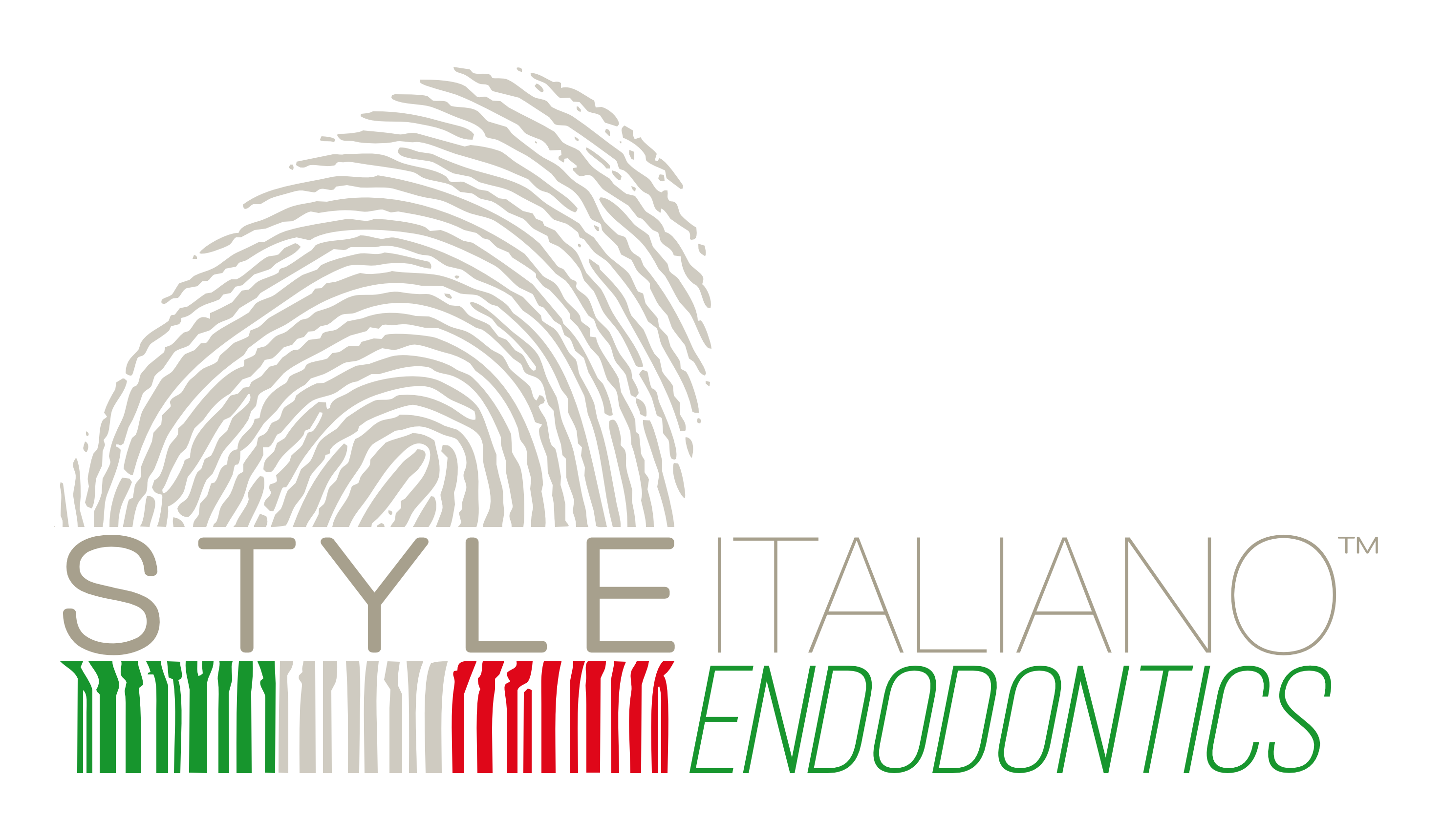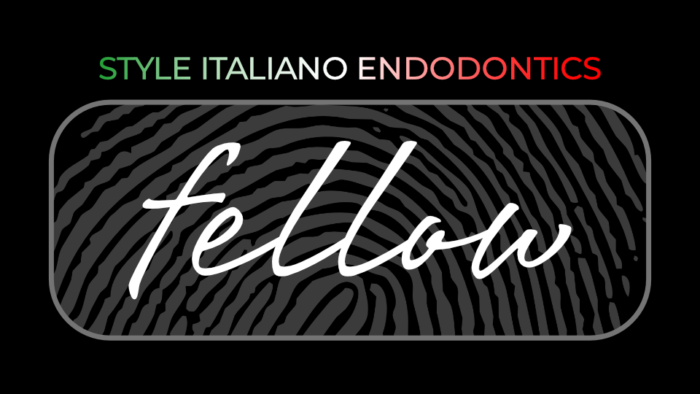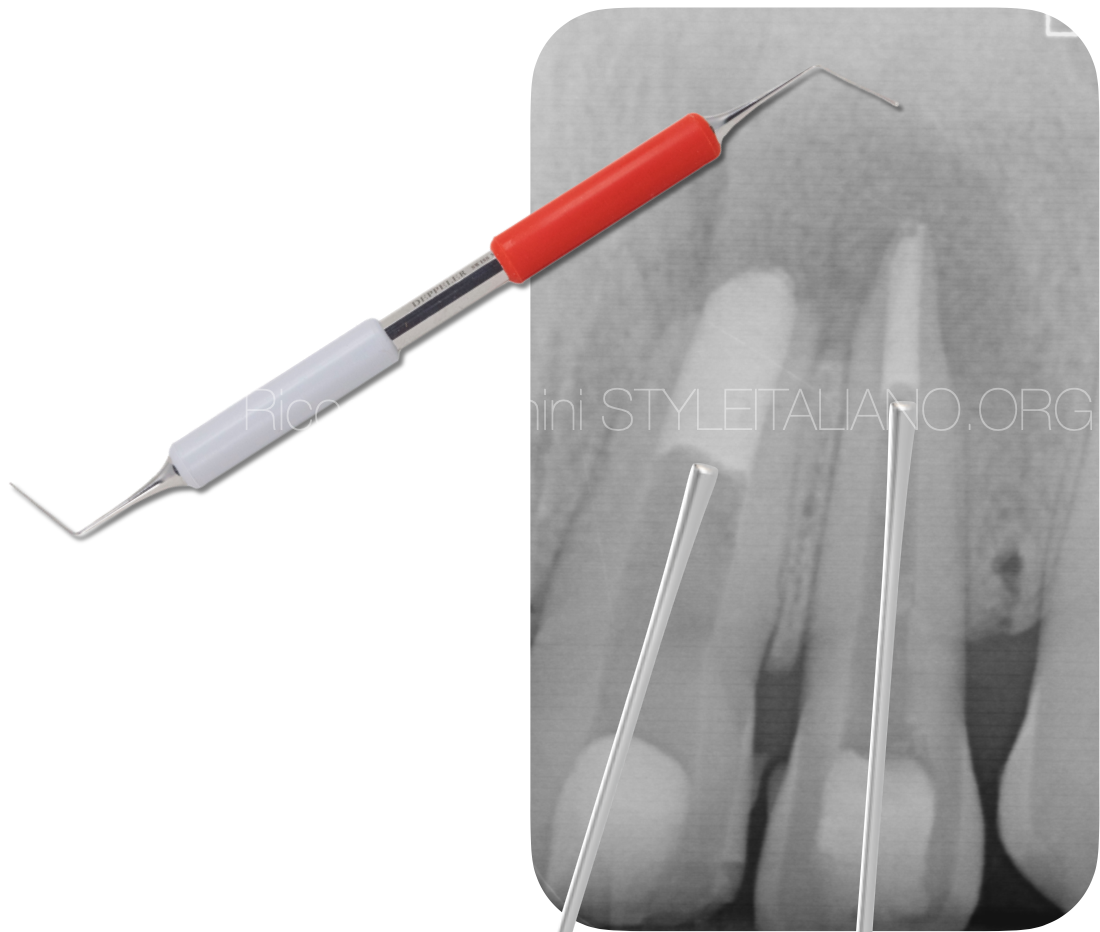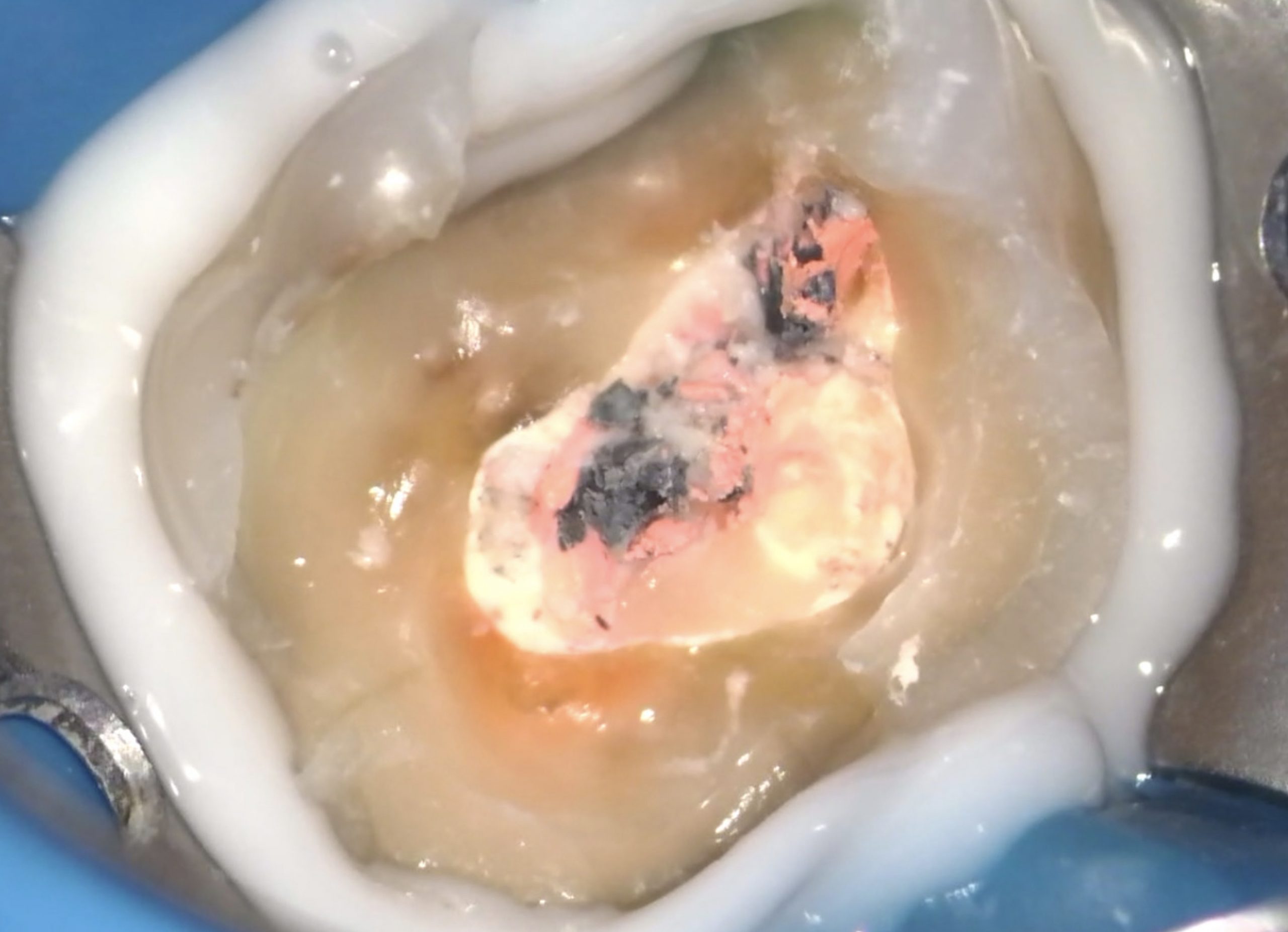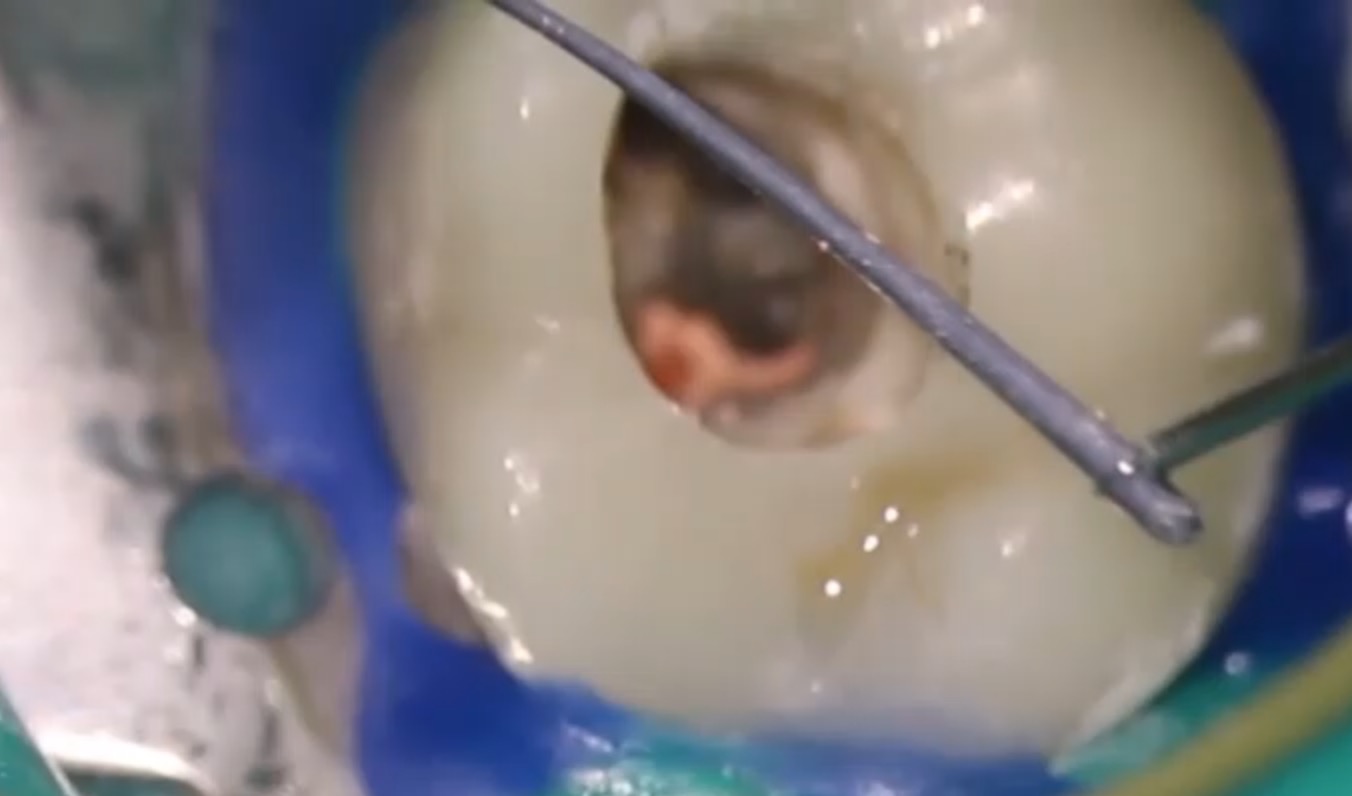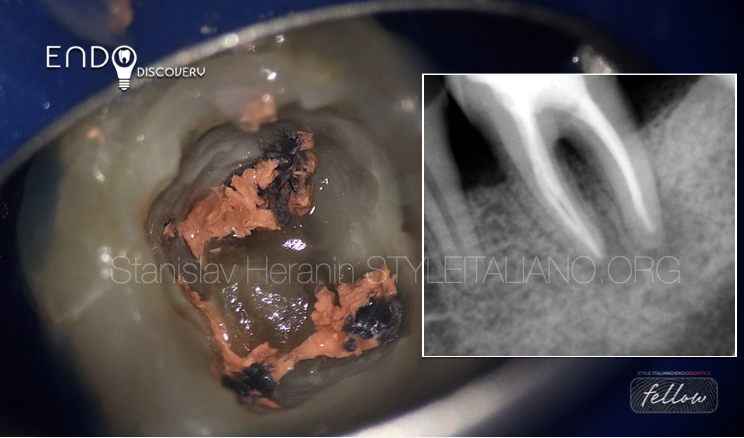
How to desobturate Thermafil
26/08/2024
Fellow
Warning: Undefined variable $post in /home/styleendo/htdocs/styleitaliano-endodontics.org/wp-content/plugins/oxygen/component-framework/components/classes/code-block.class.php(133) : eval()'d code on line 2
Warning: Attempt to read property "ID" on null in /home/styleendo/htdocs/styleitaliano-endodontics.org/wp-content/plugins/oxygen/component-framework/components/classes/code-block.class.php(133) : eval()'d code on line 2
Endodontic retreatment is a fundamentally important technical procedure in current Endodontics. Failures may occur in this cases because of different reasons; however, regardless of the reason, the overall aims of endodontic retreatment are proper cleansing and disinfection of the root canal system. Nevertheless, achievement of complete removal of the filling material inside the root canal, adjustment of its shape by endodontic instruments, removal of the smear layer and smear plug, followed by placement of an interappointment dressing to assure disinfection of the root canals are very difficult procedures. These difficulties are often related to the root canal anatomical complexity, technical limitations of the method used by the professional for the endodontic retreatment and methods used to desobturate the canal and retrieve obstacles like separated fragments.
Thermafil is a widely used method of obturation of root canals. However, many operators are facing difficulties to retreat failed Endodontic cases with carrier-based obturation.
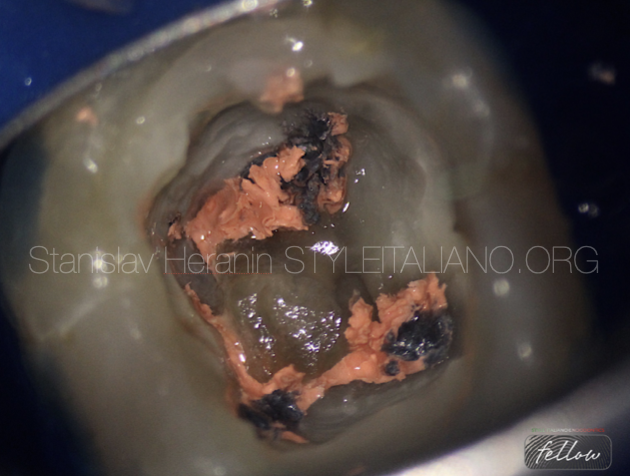
Fig. 1
Referred
Patient A., 42 yo, 3.7 Acute Apical Abscess «Hot Tooth»
Extremely tender to percussion
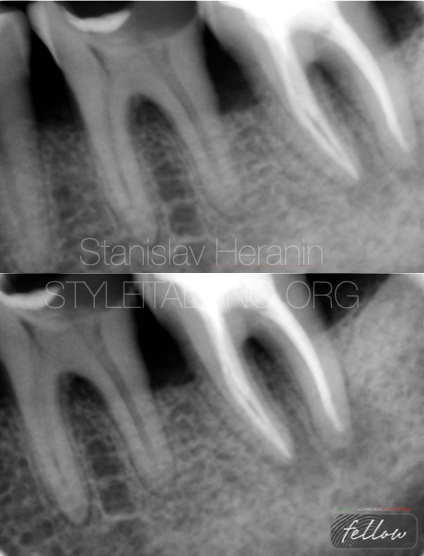
Fig. 2
Pre-operative X-Ray
Patient A., 42 yo, 3.7 Acute Apical Abscess «Hot Tooth»
8 y following Endodontic treatment
Diagnostic radiograph revealed the periapical radiolucent area.
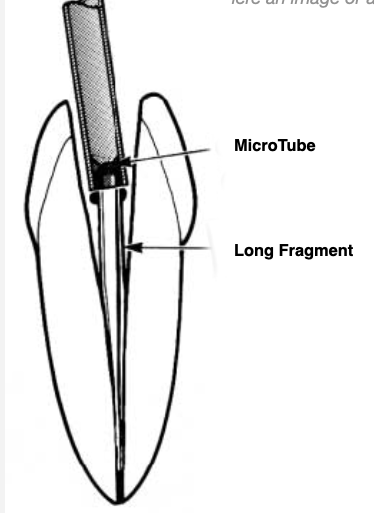
Fig. 3
MicroTube
Well described in the literature helpful method to retrieve the long separated fragments
MicroTube
It is easy to make this microtube chair-side with the use of simple cannula and H-file
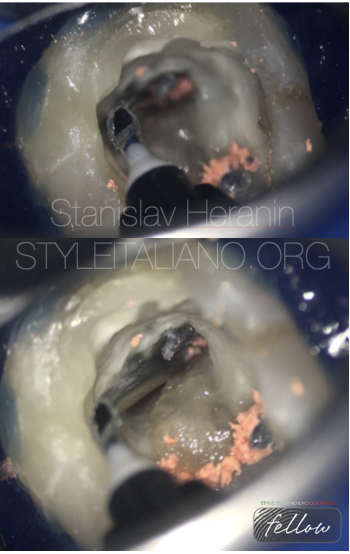
Fig. 4
Protocol
1) remove the gutta-percha around the carrier 4-5 mm deep with the use of US file or any solvent
2) under the direct microscope-assisted visual control place deep the microtube over the plastic carrier
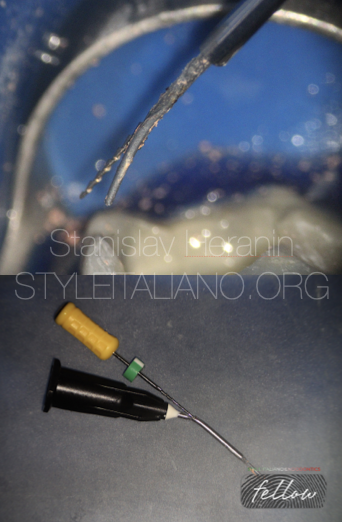
Fig. 5
Protocol
3) use the H-file with the appropriate size to block the plastic carrier inside the micro-tube
4) with slight swinging motions carefully remove the whole structure out of the canal
Protocol
Placement of the microtube over the plastic carrier
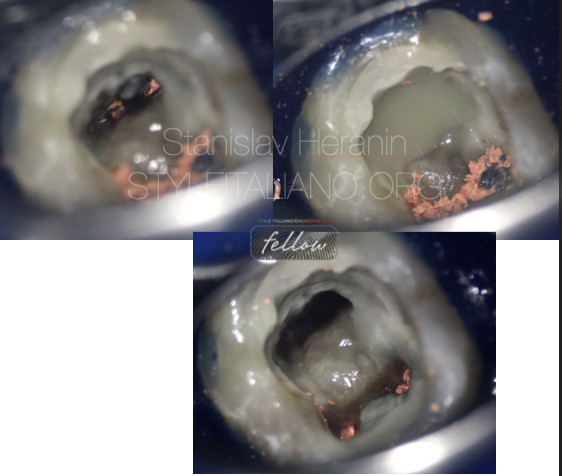
Fig. 6
Protocol
Retrieval of the plastic carrier
Notice the Exudate from the canal
Protocol
Retrieval of the plastic carrier
Notice the Exudate from the canal
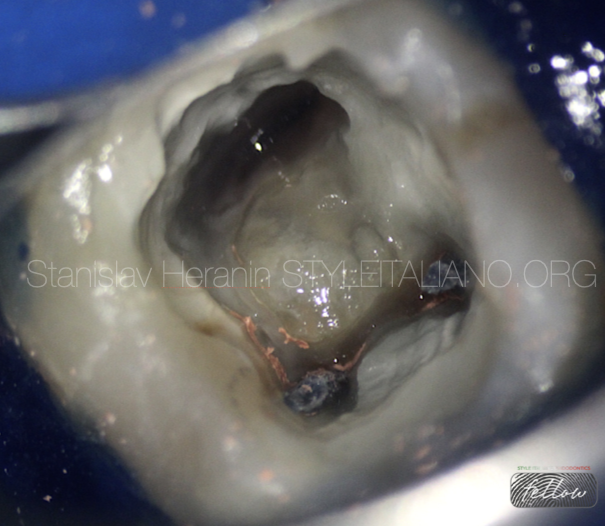
Fig. 7
Mesial System
Mesial system is inconvenient to use microtube due to the risk of the excessive intracanal dentin sacrifice establishing deep straight line-access
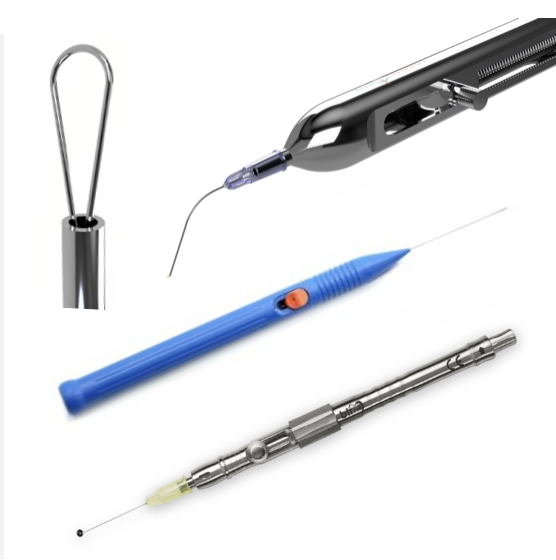
Fig. 8
Endodontic Loop (Lasso Technique)
The most safe way to retrieve the carrier and secure the inracanal dentin is to use the Endodontic loop (Lasso) available on the market or hand-made with the thin wire and syringe
Protocol
1) remove the gutta-percha around the carrier 3-4 mm deep with the use of US file or any solvent
2) under the direct microscope-assisted visual control place deep and tighten the Endodontic loop over the plastic carrier
Protocol
3) with slight swinging motions carefully remove the loop with plastic carrier out of the canal
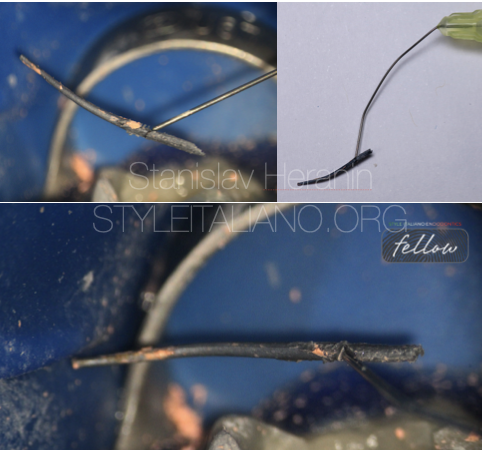
Fig. 9
example
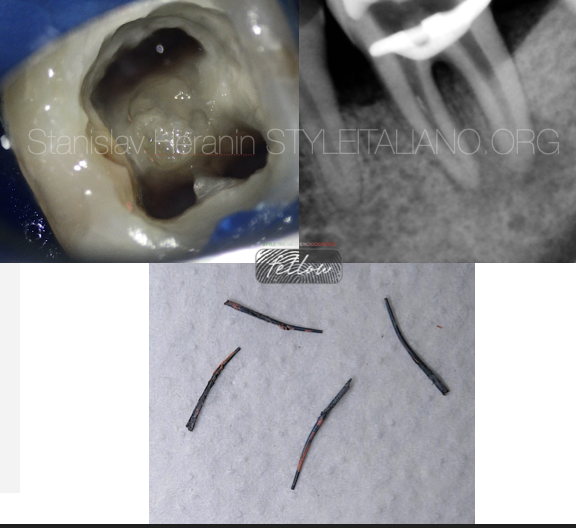
Fig. 10
Plastic carriers Retrieval
4 plastic carriers retrieved with 2 different methods thus establishing «glide path» to the apex.
This procedure facilitates the following Cleaning and Shaping of the root canals
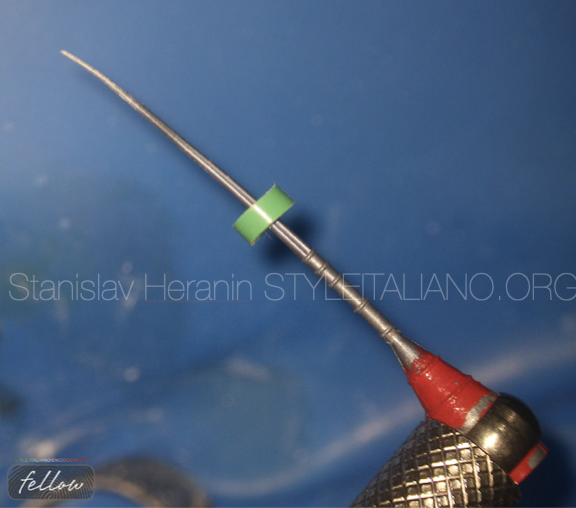
Fig. 11
MTA plugs & Thermafil carriers (Advanced Technique)
MAF: Mesial system 60.02, Distal System: 80.02 justified the use of calcium-silicate hydraulic cement as apical plugs
It is convenient to use special Endodontic file holder to facilitate the manipulations under the microscope
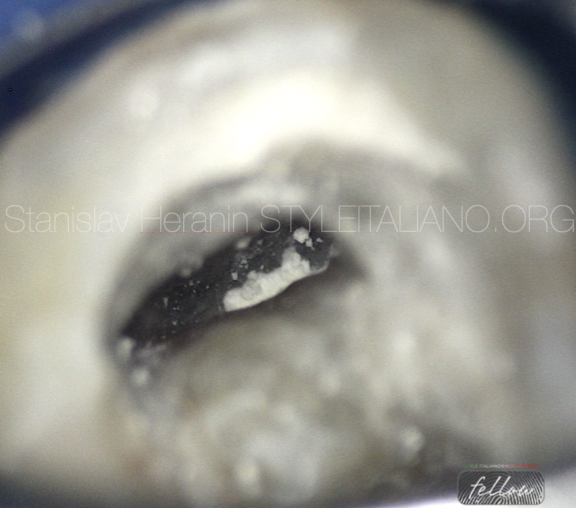
Fig. 12
MTA plugs & Thermafil carriers (Advanced Technique)
MAF: Mesial system 60.02, Distal System: 80.02 justified the use of calcium-silicate hydraulic cement as apical plugs
It is convenient to use special Endodontic file holder to facilitate the manipulations under the microscope
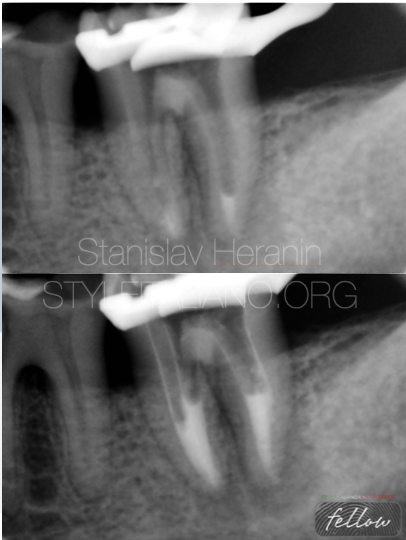
Fig. 13
MTA plugs & Thermafil carriers (Advanced Technique)
Incremental placemt of the MTA plugs
Radiographic control of the initial and final increments
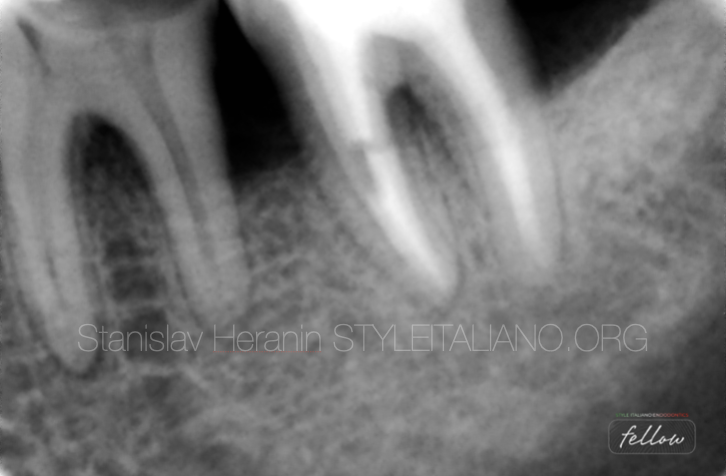
Fig. 14
2.5 years follow up
Asymptomatic
Complete healing of the periodical lesions

Fig. 15
About the author:
Stanislav Heranin
1999: Graduated in Dentistry from the Ukrainian Medical Stomatological Academy - Faculty of Dentistry
1999-2001 - Postgraduate Education (UMSA)
2001-2012 - Professor Assistant - Department of Therapeutic Dentistry (UMSA)
2012-2019 - Professor Assistant - Department of Postgraduate Education of Dental Practitioners (UMSA)
2011: PhD in Dentistry (Ukrainian Medical Stomatological Academy)
2023 until now Associate Professor at The Department of Dentistry – School of Medicine - V.N.Karazin
Kharkiv National University
Private Dental Practice - Dental Centre “Machaon” (Poltava, Ukraine)
Founder of the Educational Centre EndoDiscovery
Past-President of the Ukrainian Academy of Esthetic Dentistry
Board Member of the Ukrainian Endodontic Association
Member of the Ukrainian Endodontic Society
Member of International Jury of Dental Restorative Contest ”Prisma-Championship”
Board member of the International Journal “Ukrainian Dental Journal”
Conclusions
Placement of the traditional MTA plug in a long curved root canals makes it quite challenging for the operator.
Success or failure depend on the ability to access the perforation area and promote an appropriate sealing.
Visual control of every single manipulation under the operational microscope gives the is the crucial factor in daily
Endodontic failures occur mainly due to insufficient cleaning and further tight sealing of the root canal system.
One of the important step in root canal pretreatment is the desobturation. In cases of Thermafil desobturation it is crucial to retrieve the plastic carrier first to establish glide path to the apex facilitating following cleaning and shaping procedures. It is convenient to use micro-tube and Endodontic loop methods to retrieve plastic carrier thus making Endodontic pretreatment safe.
Bibliography
- Filho, Flares Baratto, José Roberto Vanni, Orlando Limongi, Denise Piotto Leonardi, Fabrício Scaini and F. Fagundes. “Retreatment of Thermafill fillings with the ProFile .04 system at 350 or 2000rpm.” (2006)
- Bertrand MF, Pellegrino JC, Rocca JP, Klinghofer A, Bolla M. Removal of Thermafil Root Canal Filling Material. J Endod 1997;23:54-57
- Giovarruscio M, Uccioli U, Malentacca A, Koller G, Foschi F, Mannocci F. A technique for placement of apical MTA plugs using modified Thermafil carriers for the filling of canals with wide apices. Int Endod J. 2013 Jan;46(1):88-97. doi: 10.1111/j.1365-2591.2012.02115.x. Epub 2012 Nov 9. PMID: 23137342
- Rödig T, Wagner J, Wiegand A,Rizk M. Efficacy of the ProTaper retreatment system in removing Thermafil, GuttaCore or vertically compacted gutta-percha from curved root canals assessed by micro-CT. International Endodontic Journal 2018;55:808-815
- Wolcott J, Himel VT, DDS, Lamar Hicks M. J Endod 1999. Thermafil Retreatment Using a New "System B“ Technique or a Solvent;25:761-764
- Torabinejad M, Parirokh M, Dummer PMH. Mineral trioxide aggregate and other bioactive endodontic cements: an updated overview - part II: other clinical applications and complications. Int Endod J. 2018 Mar;51(3):284-317. doi: 10.1111/iej.12843. Epub 2017 Oct 11. PMID: 28846134
- Castellucci A. The use of mineral trioxide aggregate in clinical and surgical endodontics. Dent Today. 2003 Mar;22(3):74-81. PMID: 12705015
- Beasley RT, Williamson AE, Justman BC, Qian F.Time Required to Remove GuttaCore, Thermafil Plus, and Thermoplasticized Gutta-percha from Moderately Curved Root Canals with ProTaper Files. J Endod 2013;29:125-128
